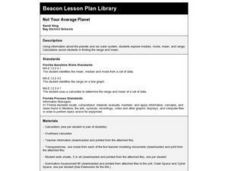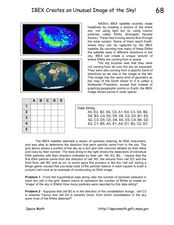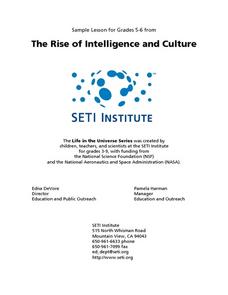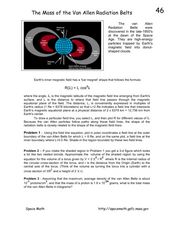Curated OER
TE Activity: Muscles, Muscles Everywhere
Young scholars study three different muscle types and investigate the affect of space travel on astronauts' muscles. They examine how exercise has a positive affect on muscle both on Earth and in space while looking at engineers' roles...
Curated OER
Digestive System
Students analyze how the digestive system works by taking the food we eat and breaking it down for our bodies to use for various reasons. They list the major components of the digestive system and draw a diagram. They explain how...
Curated OER
Does Your Rectangle Have Guts?
Does it? Kids find the perimeter and area of different shapes to assess whether their rectangle has guts. In addition to finding the area of a rectangle, learners work to find the area of a trapezoid. All worksheets are included.
Curated OER
Planet Structure & Interior
Students compare Jupiter and Earth. In this Earth and space studies lesson, students compare the composition of Earth and Jupiter and analyze how the composition affects the rate at which the planets spin.
Curated OER
Not Your Average Planet
Fourth graders explore median, mode, mean, and range using information about the planets and our solar system.
Curated OER
IBEX Creates an Unusual Image of the Sky!
In this IBEX satellite worksheet, students read about the Energetic Neutral Atoms that are detected by the IBEX satellite. Students use a given hypothetical data string to determine the number of particles detected and create an 'image'...
Curated OER
Movie Math Problems
In this algebra worksheet, students solve word problems by identifying the missing word to complete the sentence that make the equation a true statement. There are 10 questions with an answer key.
Curated OER
Extraterrestrial Communication: Can We Talk to Anybody Out There?
Students examine the possibilities of communication with other living organisms within our solar system through research and hands on activities, as well as observing and analyzing teacher demonstrations.
Curated OER
Our Solar System to Scale
Middle schoolers calculate the diameter of planets and their relative distances. In this space science lesson, students discover how small or big the planets are in comparison to each other. Middle schoolers use cross multiplying...
University of Colorado
Modeling Sizes of Planets
The density of the huge planet of Saturn is 0.7 g/cm3, which means it could float in water! In the second part of 22, science pupils explore the size and order of the planets. They then calculate weight and/or gravity and density of...
Curated OER
Just Passing Through
Students examine the functions of the kidney and its place in the urinary system. They discuss how astronauts go the bathroom in space, examine labeled diagrams of the urinary system, and draw a large scale drawing of the excretory...
Curated OER
Magnetic Storms
In this magnetic storms worksheet, students use a given formula for the volume of a ring-shaped disk to solve 2 questions about the total atoms present in the disk and the total mass of the Ring Current.
Curated OER
The Io Plasma Torus
In this plasma torus worksheet, students solve 5 problems including finding the dimensions of the Io torus, determining the formula for the volume of a torus, finding the actual volume of the Ion torus and finding the amount of sodium...
Curated OER
Number Sentences Puzzles
In this number sentence puzzle instructional activity, students are given 2 number sentences and they determine which stories match the sentences. They are also given a story and they determine which number sentence matches the given story.
Curated OER
Measuring Speed in the Universe
In this measuring speed in the universe worksheet, students use photographs of 3 astronomical phenomena including supernova explosions, coronal mass ejections and solar flare shock waves to find how fast they move. The photographs show...
Curated OER
Hubble Spies Colliding Asteroids!
In this colliding asteroids worksheet, students are given the equation to determine the collision time for asteroids. Students use this equation to solve 4 problems including finding the area of a cross-section through the body of an...
Curated OER
Modeling a Planetary Nebula
For this modeling a planetary nebula worksheet, students use a diagram to calculate the intensity at different radii from the center of the nebula. Students use the Pythagorean Theorem to determine the distance between two points on the...
Curated OER
Chandra Studies and Expanding Supernova Shell
In this supernova learning exercise, students read about the expanding supernova shell that was discovered by the Chandra X-ray Observatory. Students solve two problems including finding the scale of the given images and determining the...
Curated OER
Solid Rocket Boosters-II
In this solid rocket boosters worksheet, students solve 2 problems using a grid showing a cross section of a proposed solid rocket booster. Students complete the grid and shade the rings of combustion in 15-second step intervals. They...
Curated OER
The Mass of the Van Allen Radiation Belts
In this van Allen Radiation Belts worksheet, students are given the formula for the field line of the Earth's inner magnetic field. Students use this equation to find the polar coordinates of a field line in the van Allen Belts. They...
Curated OER
Science: Reading a Compass
Learners demonstrate how to take bearings using a compass. In pairs, they select objects in the classroom then write down its first initial and bearing. They exchange papers and try to disciver their partner's object.
Curated OER
A Relatively Far Out Idea: Estimating
Students investigate methods of estimating through cooperative group activities, hands-on activities, the use of tables and graphs and an interactive video.
Curated OER
Planet Vacation
In this planets worksheet, students fill out a chart where they fill in the distance each planet is from the Earth, and how much travel time in years and hours it would take to get there. Students do this for 8 planets.
Curated OER
Unit Conversions
In this unit conversions worksheet, students convert units such as kilometers, meters, centimeters, feet, hours, and minutes. Students complete 22 problems.

























